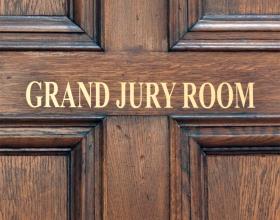 With all the uproar surrounding the grand jury decision in Ferguson, it seems to me that our greatest need is an understanding of what a grand jury is instructed to do and the process by which it arrives at a decision.
With all the uproar surrounding the grand jury decision in Ferguson, it seems to me that our greatest need is an understanding of what a grand jury is instructed to do and the process by which it arrives at a decision.
I have served on a grand jury. It doesn’t make me an expert, but it does give me some credibility to speak on how a grand jury operates.
A grand jury is a group of citizens convened to decide whether or not there is enough evidence to indict a defendant. The grand jury does not hear the defense side of the case. It only hears the prosecution’s case against the defendant.
Think about that. The prosecutor’s job is to build a case AGAINST a person accused of a crime. They are there to present evidence AGAINST an individual. Their goal is to convince the grand jury to indict. It should be very clear that this is what they want to do. There is no other purpose for the grand jury to exist other than to hear the prosecutor’s case against someone and decide if it is strong enough to give him or her the desired outcome. No prosecutor is going to present evidence why a person should not be indicted. That would be absurd.
Pursuant to this goal, the prosecutor defines the charge(s) in legal terms. There are very specific demands that must be met in accordance with municipal, county, state and federal statutes. He or she then brings in detectives, arresting officers, other persons who have some material involvement in the case and witnesses who must all testify, under oath, before the grand jury. The jurors can ask questions of the prosecutor or of anyone presenting sworn testimony to them.
The grand jury is also considered an investigative body. In other words, it can request to hear other witnesses, consider evidence or ask questions about evidence that is presented, and pursue any line of questioning that is thought to be relevant to the case. The reason for this is that the grand jury must vote to indict or to deny an indictment sought by the prosecutor. If the jurors feel that evidence was withheld or manipulated, or that a witness was not sincere, then they cannot vote in good faith. They must be satisfied that their vote is in accordance with their true belief.
The grand jury DOES NOT DECIDE THE GUILT OR INNOCENCE of a defendant. It only votes to determine PROBABLE CAUSE. In most cases, the bar is set very low to meet this standard. In other words, the prosecutor has a fairly minimal job to do. He or she only has to present enough evidence to suggest that the defendant may have committed the crime. The actual trial will ferret out all of the relevant evidence for and against the indictment. That is not the job of the grand jury.
What if the grand jury votes to indict a person when the evidence is not sufficient to warrant the indictment? The prosecutor is then charged with the burden of bringing a case to the court that may be thrown out, that may be judged frivolous, or that may appear extremely prejudicial to the public. Every prosecutor wants to avoid these embarrassments, regardless of the pressure brought to bear on the office by those who have a stake in the matter. Moreover, it would represent a gross exploitation of a public agency.
Simply put, the grand jury did not hear or see enough evidence to indict Officer Darrin Wilson. If further proceedings against him are desired, it will not be in accordance with the legal system.